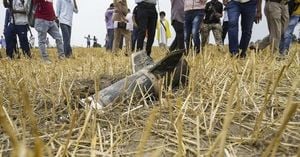As South Africans celebrate the centenary of Afrikaans as an official language, the future of this unique linguistic heritage hangs in the balance. Afrikaans was designated as South Africa's second official language on May 8, 1925, alongside English, replacing Dutch. This year, 2025, marks a significant milestone, but the language's roots run deeper than its official status. It emerged as a creole language born from the complex history of colonialism, slavery, and cultural blending.
The first written records of Afrikaans can be traced back to the early 1800s, when Islamic scholars in Cape Madrassas began documenting the language in Arabic script. This rich history is not just a tale of words but a narrative woven with the pain of displaced indigenous peoples and the struggles of their descendants.
Despite its troubled past, Afrikaans remains a vital part of South Africa's cultural landscape. However, leaders warn that the language is at risk of fading away as schools increasingly drop it from their curriculums amid political pressures. EFF MP Carl Niehaus, who grew up speaking Afrikaans, emphasizes the importance of preserving the language. “We should be careful not to use Afrikaans for political and racial purposes because it damages the language,” he stated. He advocates for Afrikaans to be recognized as one of South Africa's twelve official languages, arguing that it should not be confined to exclusivity.
The Federation of Afrikaans Cultural Associations (FAK) has also voiced its commitment to preserving Afrikaans. Spokesperson FC Pelser described the language as the “language of the Afrikaner ancestors” and stressed the importance of living out, protecting, and developing it. In celebration of this centenary, FAK has launched initiatives such as a songwriting competition called Skryf’it, in collaboration with Vonk Musiek and Entertainment and Event Factory, and plans to introduce an Afrikaans 100 board game later this month.
However, the fight for Afrikaans' survival is far from over. Freedom Front Plus (FF+) leader Corné Mulder pointed out that the language faced near extinction during the early years of democracy in 1994 when proposals were made to establish English as the sole official language. Mulder's party was among those who opposed this idea, advocating for the recognition of Afrikaans and other indigenous languages.
Despite these efforts, the number of Afrikaans single-medium schools has dwindled significantly. By the end of 2024, only 1,303 of approximately 25,000 schools in South Africa were still Afrikaans medium, marking a 15% decrease from 2012, when there were 1,531 such schools. This decline raises serious concerns about the language's future.
Political analyst Piet Croucamp expressed skepticism about Afrikaans' long-term viability, predicting that in 30 to 40 years, Afrikaans-speaking individuals might comprise less than two percent of the population. He noted that the language's association with apartheid and white privilege complicates its acceptance in contemporary South Africa.
As the centenary celebrations unfold, the community is reminded that Afrikaans is not just a language but a cultural identity that must be cherished and protected. The ongoing dialogue about its status reflects broader societal issues, including the need for inclusivity and respect for linguistic diversity.
In a separate but equally poignant development, the South African National Editors' Forum (Sanef) expressed deep sorrow over the recent discovery of bodies believed to belong to missing journalist Aserie Ndlovu and his partner, Zodwa Mdhluli. The couple vanished in February 2025, and while police have found human remains, DNA testing is ongoing to confirm their identities. Sanef has extended condolences to the families, urging that justice be served to bring closure.
Ndlovu was a prominent figure in community media, managing Capital Live FM in Mamelodi and actively participating in the National Press Club. His disappearance has raised concerns about the safety of journalists in South Africa, a country where media freedom is often challenged.
In another significant announcement, the South African Post Office (SAPO) is set to receive a R381 million wage subsidy from the government. This financial support aims to cover salaries for nearly 6,000 employees over the next six months as part of a broader business rescue initiative. Portfolio Committee chair Khusela Diko described this assistance as a “much-needed lifeline” for the struggling entity, which has faced numerous financial challenges.
The government’s commitment to supporting the SAPO comes in the wake of a formal request from the business rescue team for an additional R3.8 billion to ensure the organization's sustainability during its ongoing financial overhaul.
Lastly, the Gauteng Education Department has urged calm at Musi High School in Pimville, Soweto, following the tragic death of an 18-year-old Grade 11 pupil, Mcebo Biyelawas. The young student was fatally stabbed and beaten at a soccer ground in Kliptown, prompting protests that disrupted classes. In response, the department has deployed psycho-social support teams to counsel affected learners and has extended condolences to Biyela's family and the school community.
As South Africa navigates these complex issues—from the celebration of Afrikaans to the mourning of lost lives—the country stands at a crossroads. The future of its languages and its commitment to justice and safety for all citizens will shape the narrative of this diverse nation.





